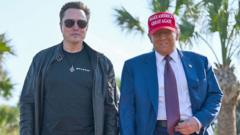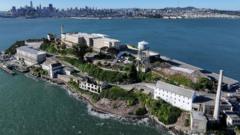The recent freeze of $440 million in US aid by President Trump due to South Africa's land expropriation bill has triggered a significant reevaluation of diplomatic ties, sparking fears of deeper economic repercussions for the nation while its government stands firm on its policies.
Trump's Aid Freeze Sends South Africa's Future into Flux

Trump's Aid Freeze Sends South Africa's Future into Flux
As tensions rise following the freeze on US aid, South Africa confronts a precarious balance in its international relations amid Trump's controversial stance on land reform.
The diplomatic relationship between South Africa and the United States finds itself in a precarious state following President Donald Trump’s controversial decision to halt financial aid to the country last week. Citing what he termed "unjust and immoral practices" against the white minority Afrikaner community and aligning his stance with a genocide case against Israel, Trump’s actions have amplified existing tensions. His move has sent ripples of concern throughout South Africa, with experts predicting potential retraction of the preferential access provided under the Africa Growth and Opportunity Act (Agoa).
Historically, US-South Africa relations, marked by friendship since the end of apartheid in 1994, have seen numerous fluctuations. The launch of Trump’s executive order came shortly after South African President Cyril Ramaphosa’s controversial Expropriation Bill, which allows governmental confiscation of land without compensation under certain circumstances. Trump's harsh rhetoric and promised financial repercussions framed South Africa as a subject of significant ire, particularly as he accused the nation of “aggressive positions” towards the US and accusations regarding the rights of its citizens.
The aid freeze is reported to involve nearly $440 million, with a notable exception for the Pepfar program aimed at combating HIV, crucial for South Africa where approximately 5.5 million people rely on its anti-retroviral support. Moreover, the situation has been harnessed by conservative Afrikaner groups pushing anti-Afrocentric policies that resonate with Trump’s narrative.
Remarkably, this isn't the first instance of Trump's unyielding criticism toward South Africa’s land policy. In 2018, he claimed South African authorities were executing "large-scale killings" of farmers, which faced backlash at the time. Political analysts note that the current response, characterized by Trump's executive order, is unprecedented in its severity.
For South Africa, which exports significant minerals to the US under Agoa - generating approximately $2.7 billion in revenue, the future of this trade agreement hangs in the balance. Experts speculate that, as the review process approaches, South Africa's continued benefit under Agoa is precarious. The cumulative irritations from the US administration about South African policies could soon lead to tangible economic penalties.
In an environment of heightened scrutiny and demand for accountability, South African Foreign Minister Ronald Lamola has reiterated the country's commitment to uphold its principles regarding international law, despite the potential fallout. The Ramaphosa administration has stated its intention to clarify South Africa's foreign policy stance in light of these developments, with a key focus on engaging with the US.
Compounding the challenge, US Secretary of State Marco Rubio confirmed his absence at an upcoming G20 foreign ministers' meeting in Johannesburg, deeming the South Africa administration anti-American. Conversely, the European Union has extended its support, presenting an important ally for South Africa amid declining US relations.
As South Africa navigates this landscape marked by volatility, observers suggest a strategic focus on the minerals it offers as a potential negotiating leverage against the shifting tides of US trade policy and influence from emerging global powers within the BRICS framework. The unfolding scenario underscores the critical nature of diplomacy in mitigating the fallout from this geopolitical chess game instigated by Trump and echoed by South African figures like Elon Musk.
Historically, US-South Africa relations, marked by friendship since the end of apartheid in 1994, have seen numerous fluctuations. The launch of Trump’s executive order came shortly after South African President Cyril Ramaphosa’s controversial Expropriation Bill, which allows governmental confiscation of land without compensation under certain circumstances. Trump's harsh rhetoric and promised financial repercussions framed South Africa as a subject of significant ire, particularly as he accused the nation of “aggressive positions” towards the US and accusations regarding the rights of its citizens.
The aid freeze is reported to involve nearly $440 million, with a notable exception for the Pepfar program aimed at combating HIV, crucial for South Africa where approximately 5.5 million people rely on its anti-retroviral support. Moreover, the situation has been harnessed by conservative Afrikaner groups pushing anti-Afrocentric policies that resonate with Trump’s narrative.
Remarkably, this isn't the first instance of Trump's unyielding criticism toward South Africa’s land policy. In 2018, he claimed South African authorities were executing "large-scale killings" of farmers, which faced backlash at the time. Political analysts note that the current response, characterized by Trump's executive order, is unprecedented in its severity.
For South Africa, which exports significant minerals to the US under Agoa - generating approximately $2.7 billion in revenue, the future of this trade agreement hangs in the balance. Experts speculate that, as the review process approaches, South Africa's continued benefit under Agoa is precarious. The cumulative irritations from the US administration about South African policies could soon lead to tangible economic penalties.
In an environment of heightened scrutiny and demand for accountability, South African Foreign Minister Ronald Lamola has reiterated the country's commitment to uphold its principles regarding international law, despite the potential fallout. The Ramaphosa administration has stated its intention to clarify South Africa's foreign policy stance in light of these developments, with a key focus on engaging with the US.
Compounding the challenge, US Secretary of State Marco Rubio confirmed his absence at an upcoming G20 foreign ministers' meeting in Johannesburg, deeming the South Africa administration anti-American. Conversely, the European Union has extended its support, presenting an important ally for South Africa amid declining US relations.
As South Africa navigates this landscape marked by volatility, observers suggest a strategic focus on the minerals it offers as a potential negotiating leverage against the shifting tides of US trade policy and influence from emerging global powers within the BRICS framework. The unfolding scenario underscores the critical nature of diplomacy in mitigating the fallout from this geopolitical chess game instigated by Trump and echoed by South African figures like Elon Musk.



















